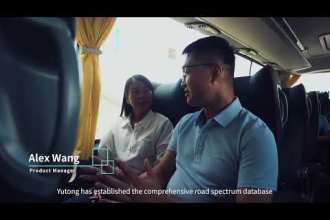- Hyundai Motor Group engages in strategic dialogue in the session “Hydrogen, Beyond Mobility, New Energy for Society” at APEC CEO Summit Korea 2025
- Vice Chair Jaehoon Chang emphasizes hydrogen’s role as a catalyst of carbon neutrality and strategic energy carrier
- The Group calls for global collaboration to advance the hydrogen ecosystem through government-industry partnerships
- The Group showcases nearly 30 years of hydrogen leadership beyond mobility across the comprehensive value chain―from production and storage to utilization
Hyundai Motor Group (the Group) today held a high-level dialogue on hydrogen strategy at the Asia-Pacific Economic Cooperation (APEC) CEO Summit Korea 2025. Hyundai Motor Group Vice Chair and Hydrogen Council Co-Chair, Jaehoon Chang, joined Hydrogen Council CEO, Ivana Jemelkova, to discuss the current state of the hydrogen industry and its role in sustainable growth across the Asia-Pacific region.
Under the theme “Bridge, Business and Beyond,” the APEC CEO Summit brought together global leaders to address challenges such as regional integration, digital transformation, and sustainability. In the session titled “Hydrogen, Beyond Mobility, New Energy for Society” led by the Group, Vice Chair Chang emphasized hydrogen’s role in achieving carbon neutrality and energy resilience, and called for coordinated efforts to accelerate adoption.
“Hydrogen accelerates carbon neutrality by addressing the intermittency of renewables and enhancing energy resilience,” said Jaehoon Chang, Vice Chair of Hyundai Motor Group. “Hydrogen also stands out as a strategic energy carrier, enabling localized generation and distribution systems—such as off-grid and microgrid ecosystems—that reduce reliance on centralized grids and strengthen communities’ self-sufficiency.”
During the session, Vice Chair Chang and Hydrogen Council CEO, Ivana Jemelkova, shared insights on the Global Hydrogen Compass 2025, which outlines a pivotal moment for the industry—shifting from ambition to delivery with USD 110 billion of committed capital across 510 projects past financial investment decision globally.
Vice Chair Chang also emphasized that long-term collaboration between governments and industry is essential to transform early efforts and innovations into meaningful, scalable outcomes across the hydrogen value chain.
“Since 2020, global capital commitments to clean hydrogen have grown ten times―a remarkable trajectory,” said Ivana Jemelkova, CEO of Hydrogen Council. “Our next big test is demand which requires clear, practical and stable policies and strong public-private collaboration. At the Hydrogen Council, the largest and only CEO-led global business initiative on clean hydrogen, we are proud to work closely with Hyundai Motor Group in their capacity of Council Co-chair to mobilize key players at this pivotal moment and keep moving hydrogen forward.”
Building on the insights shared during the session, the Group outlined how it is translating global momentum into action—by leading efforts to both drive demand and ensure supply across the hydrogen value chain.
To scale up hydrogen generation, the Group is investing in Waste-to-Hydrogen and polymer electrolyte membrane (PEM) electrolysis technologies. For PEM electrolysis, 1MW-class projects are underway in Buan and Boryeong, and a 5MW-class system is being prepared in Jeju. The Jeju project aims to establish a complete green hydrogen ecosystem—from developing mass-production technology for PEM electrolysis to expanding hydrogen mobility applications.
Since PEM electrolysis operates on the reverse principle of fuel cell technology, the Group is leveraging its extensive expertise to accelerate the hydrogen ecosystem and reinforce Korea’s leadership in clean energy.
Earlier today, the Group’s Hyundai Motor Company held a groundbreaking ceremony for a new fuel cell production plant in Ulsan. The facility will further drive localized key components and strengthen Korea’s hydrogen manufacturing base.
In addition, the Group is advancing demand creation through hydrogen-powered logistics operations in Ulsan and Pyeongtaek, Korea, and has deployed hydrogen mobility at Incheon International Airport in Korea.
Globally, it has deployed port and logistics decarbonization initiatives such as the NorCAL ZERO Project in California and HTWO Logistics in the state of Georgia, supporting clean logistics at Hyundai Motor Group Metaplant America. The Group is also expanding hydrogen infrastructure in Australia, collaborating with the New South Wales government to build hydrogen refueling stations and deploy its XCIENT fuel cell trucks, the world’s first mass-produced and leading heavy duty fuel cell truck.
“We believe creating demand and securing supply must go hand in hand. That’s why Hyundai is taking bold steps to lead on both fronts,” said Vice Chair Chang. “Building a hydrogen ecosystem is something no single company can do alone—it requires collective effort.”
The Group has been a pioneer and leader in hydrogen mobility for nearly three decades, achieving many industry firsts and bests, including the world’s first mass-produced hydrogen fuel cell heavy-duty truck and world’s best-selling hydrogen fuel cell passenger vehicle, NEXO. The Group’s vision extends beyond mobility, encompassing the full hydrogen value chain—from production and storage to transportation and utilization.
The Group is set to participate in the upcoming World Hydrogen Expo 2025 this December, reaffirming its commitment to global collaboration while driving innovation and real-world applications of hydrogen technology.








